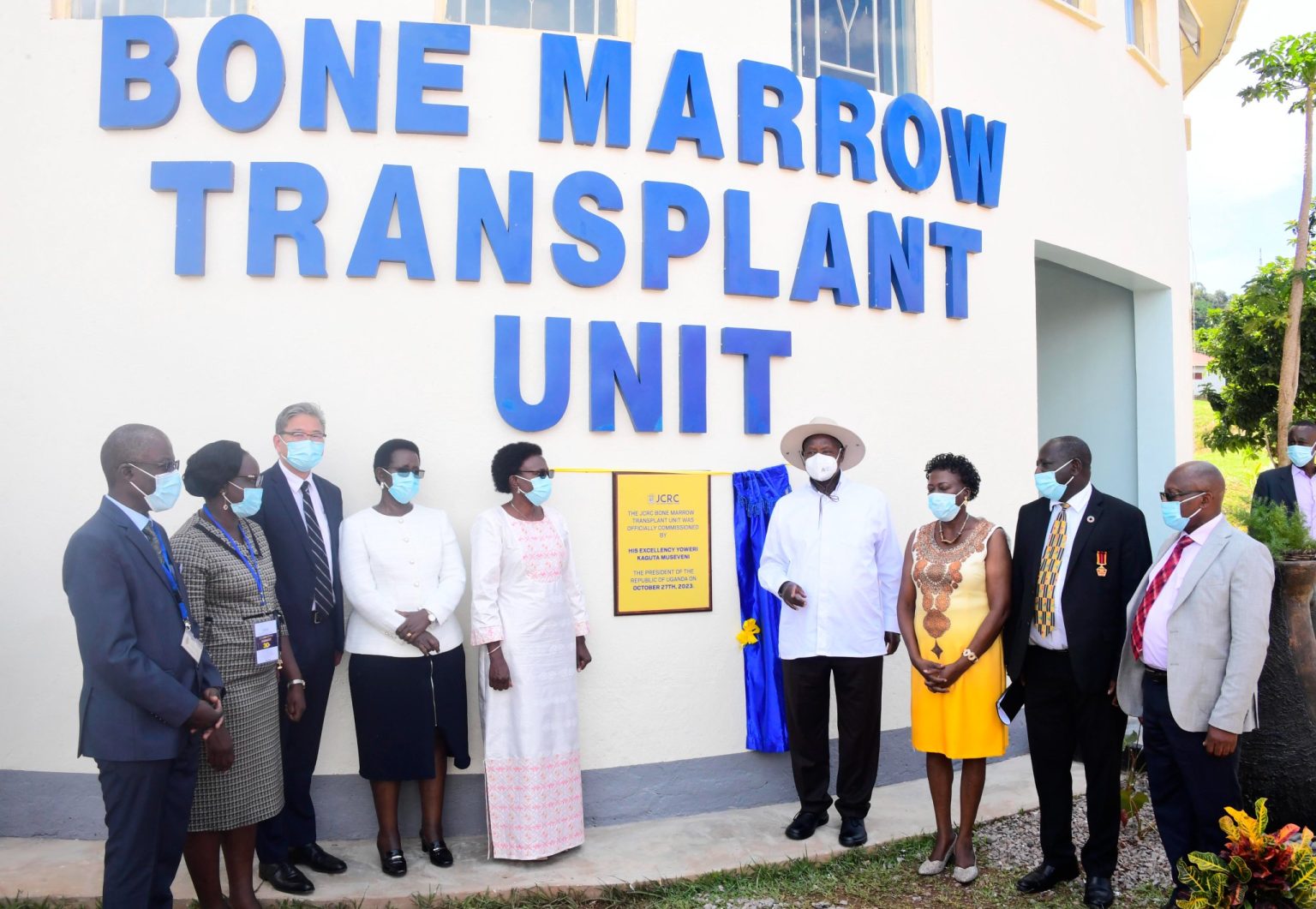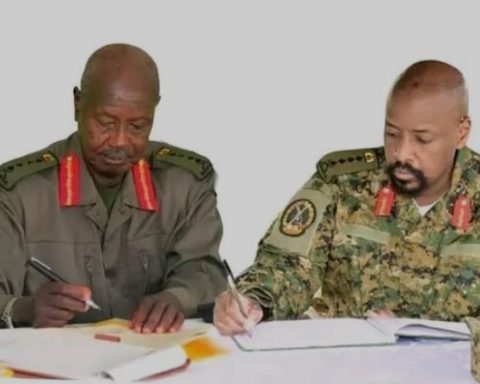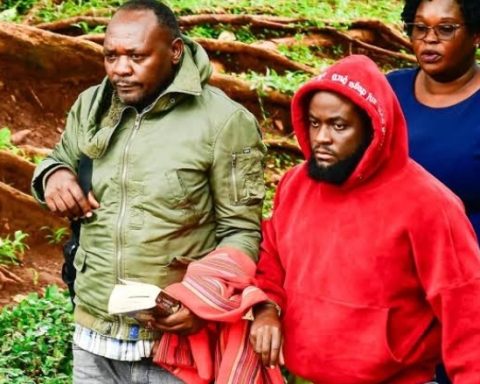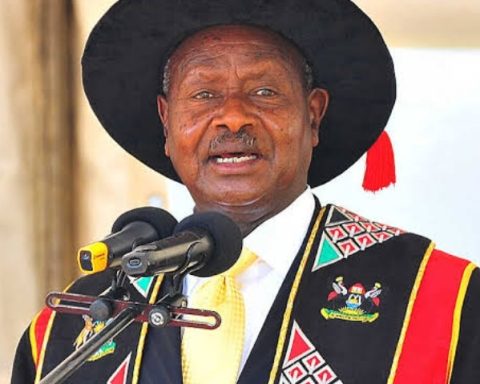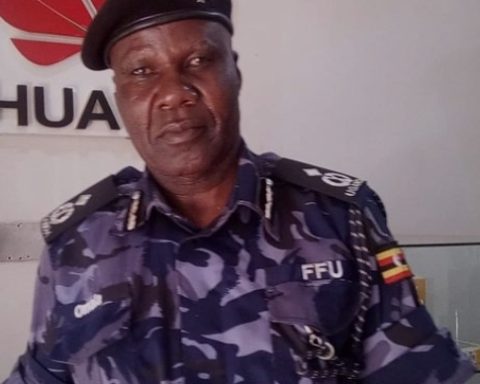President Yoweri Kaguta Museveni has launched the first-ever bone marrow transplant centre in Uganda at the Joint Clinical Research Centre (JCRC) during its 30th-anniversary celebrations.
The president also laid a foundation stone and signed off a master plan of the new proposed cell and gene therapy building at the JCRC headquarters located off Entebbe Road at Lubowa in Wakiso district on October 27, 2023.
The president congratulated JCRC upon reaching this milestone of establishing the bone marrow transplant in Uganda and accomplishing 30 years of service.
The president said that he was convinced after listening to the JCRC team that once the bone marrow transplant is done in the country, it will be cheaper than patients having to go abroad for it.
President Museveni added: “ And we shall also have the gene therapy ( okutokora) by editing some of these cells. We had some discussions with our religious people who thought that biotechnology and genetic engineering were destroying the work of God so we are trying to persuade them that no we have been doing it for a long time,”.
The president noted: “I have been a genetic engineer for a long time all my life because we the cattle keepers, always select the good breeders which will produce more milk, there are some bulls who will produce only females, we the cattle keepers are therefore the only people who appreciate females more than anybody else. if your cows are producing male bulls then you are very unlucky because what will you do with the bulls, but if they are producing females, they are good because you have a bigger breeding population,” he said.
He therefore explained to the religious leaders that gene therapy is more like selecting good breeds for milk production by cattle keepers assuring them that this method has therefore been in existence and the only difference with the human body is through editing genes using laboratory-method.
A bone marrow transplant is a procedure that infuses healthy blood-forming stem cells into your body to replace your damaged or diseased ones.
The procedure is conducted by a specialised surgeon with a team that includes transplant physicians and haematologists. Bone marrow transplant is already happening elsewhere in the greater East African region such as in Tanzania.
On the other hand, Gene therapy involves altering the genes inside one’s body’s cells in an effort to treat or stop disease.
The president added: “ Your languages are rich so they describe events better. When you are starting a fire, we call it Okuhemba omuriro in Runyankole, then the fire must be maintained. Some of us did the kuhemba which is starting the fire and you have been very good in maintaining it, so I thank the staff, the Executive directors, and the Board meme era in the last 32 years for maintaining this fire but also expanding it because you have been doing new things different from the regionally limited mandate which we started with so I thank everybody,”.
The president however challenged local scientists to do more research and develop vaccines that could deal with the present-day diseases instead of waiting on others.
“ I am surprised that we have taken so long to get the Vaccine. When we attended the AIDS conference in Florence, Italy, I don’t remember which year it was, there was quite a bit of optimism that we would get a vaccine even me I was almost becoming a molecular biologist. I was following very closely because that time we were saying that the problem is that this AIDS virus mutates, that it changes but then people were saying that although it is mutating, some potions of it don’t change and if we can capture those, then we could get a vaccine like a common denominator in the variants and recognize it,” he said
“ Then later on I heard that this was very dangerous because it enters your defence system and that is why it is not detectable. Not doing the research ourselves and letting others do the research is part of the problem because they don’t have the same pressure as we have with our local problems,” the president added.
The president cited that in 1893, many lives were lost during the smallpox epidemic saying that it is only because of the vaccine that was introduced then that today, the disease is rarely heard of today.
“ So, therefore I challenge the scientists especially our own scientists to wake up and to deal with these problems instead of just sitting and waiting for others to do the work,” he tasked them.
The president also hailed the partners who have worked closely with JCRC in promoting research and clinical development over the years.
“ I specifically want to thank Dr. Manfred Dietrich, we should recognize his contribution with a medal or something for the tremendous contribution towards this centre. I also thank our other partners like the United States Agency for International Development(USAID), the US President’s Emergency Plan for AIDS Relief ( PEPFAR), the Centers for Disease Control and Prevention (CDC), and all those groups, we thank them so much for their partnership, God will remember them and give them some place in heaven,” he hailed them.
The president later awarded the Former JCRC board Chairpersons including the Rt. Hon. Amama Mbabazi , Dr. Stephen Kavuma , Hon.Dr. Crispus Kiyonga, Justice Epelu Opio, Mr. Ben Luwum among others .
On the other hand, the minister of Health, Hon. Ruth Acheng said: “ As we are all aware, the first case of HIV/AIDS was identified in Uganda in 1982, Your Excellency, through your leadership, awareness and preventive messaging was conducted early as soon as the pandemic was identified and the Ministry of Health established sentinel sites that were used to monitor in the HIV prevalence which reached the peak of 30% in Kampala by 1992 but with no available treatment,”.
She hailed the president for establishing this great institution of JCRC which was started in 1992 saying that it aimed at finding a scientific solution to HIV then known as a slim disease which became a major health problem to the Ugandan Population.
“ We may recall that by 1991, the life expectant in Uganda was 46 years and one out of 10 children orphaned to HIV /AIDS, and quite often it was the loss of both parents and by 1992, 56% of admissions to the general hospital in Uganda were due to HIV/AIDS and 52% of deaths were attributed to HIV/AIDS,” she said.
Hon . Acheng was happy to note that today, according to the World Bank estimates, the life expectancy in Uganda has improved to 65 years crediting the government for its contribution towards that milestone.
“ The annual number of new HIV infections is 53,000 and out of the estimated 1.4 million people living with HIV, approximately 95% are on treatment with ARVs and close to 95% of those on treatment have achieved viral suppression which not only improves the life of the individuals but also reduces the transmission of HIV,” the Minister said.
The minister also elaborated that Uganda has one of the youngest populations in the world at an average age of 16.3 years and most of the new infections are occurring in the young population which has a lower treatment adherence and lower viral suppression than the older age cohorts.
“ The JCRC has made a significant contribution on each step towards ending HIV/AIDS as a public rate and we expect it to make a significant contribution on the last mile on this journey of ending AIDS by 2030,” she said.
Prof. Charles Ibingira, the chairman board of governors at JCRC hailed the president for the taking. Ahold’s decision to address the HIV challenge head-on at a time when his revolutionary leadership was required most because the disease was new and many lives were lost at that time.
“People were dying right and left, and we had no hope, but because of your vision, the situation changed, your great vision to start JCRC to intervene and address the desperate rate situation that the Ugandans were in and the untold suffering with HIV/AIDS, slim disease at a time is a clear demonstration of your great leadership and care for Ugandans, we can never thank you enough for this,” he added.
The Executive Director of JCRC, Dr Cissy Kityo Mutuluuzo highlighted that JCRC played a vital role in the fight against HIV/AIDS in the region by pioneering the use of HIV drugs in sub-Saharan Africa in 1992 and imported the first generic HIV drugs from India to bring down the costs and subsequently became the case study for the architecture of the US president’s emergency plan for AIDS Relief ( PEPFAR).
“ Your Excellency, our researchers have worked and continue to work tirelessly to discover new insights, treatments and solutions to some of the most challenging issues facing our nation and region. JCRC has been part of groundbreaking research that has contributed to Global knowledge and informed change of policy and guidelines and the course of the medicines we are taking,” she said.
Mrs Mutuluuzo said that the centre is now leading the first study in Africa to evaluate new HIV drugs which are given as injections every two months instead of taking pills every day.
“ We will continue to push the boundaries, there is no limit to knowledge and strive for excellence in research, our laboratory has pioneered many tests to monitor how HIV drugs are working including CD4 count, viral load and testing of children as early as 6 weeks, we used to test until at 8 months, now we can test them using molecular tests and determine if they should start treatment,” she said.
In her conclusion, The Executive Director invited the president to present an artistic impression of a house to one of the JCRC’s inpatients, Ms. Josephine Nakandi who was diagnosed with HIV/AIDS at the age of 3 and later developed meningitis which completely affected her brain.
“We have provided her with health care, put her in school for the disabled, she has been renting and the JCRC staff has contributed to her monthly rent. As part of corporate social responsibility, we have managed to build for her a house at Kitende about 12 kilometres from here, that is the artistic impression that we have here, please join us in presenting it to her,” she said.
Meanwhile, the president also donated UGX100 million to the JCRC members in the SACCO and also contributed sh30m towards Ms Nakandi.
![]()

